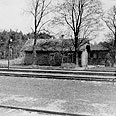
Sobibor museum shuts on fund shortage
Lack of funds forces exhibition hall at former Nazi death camp in Poland to close, drawing protests from Jewish groups
A lack of funds has forced a museum housing the former Nazi death camp of Sobibor to close, drawing protests from Jewish groups over the fate of a site where up to 350,000 Jews perished.
Poland's culture ministry said on Friday it would take charge of the museum, located in the southeast of the country, from next year, but it was not clear who would care for the 25-acre site in the interim period.
The closure comes less than a month after a German court convicted former Nazi prison guard John Demjanjuk for his role in the killing of 28,000 Jews at Sobibor during World War II. Demjanjuk, 91, is appealing against the court verdict.
"We have ceased all activity at the site. We cannot afford to keep the place orderly and tidy, it's been completely abandoned. It's hard to accept this," said Marek Bem, spokesman for the museum he co-founded in 1994.
Until now, funds from the local municipality and private donors have financed the museum.
"It is immoral in a way that the site is largely supported by a very dynamic group of victims' families, while the heirs of the perpetrators are nowhere to be seen," said Bem.
The museum needs up to 3 million zlotys ($1.10 million) annually to function and to conduct research, he added.
The American Gathering of Holocaust Survivors and their Descendants issued a statement deploring the closure.
'Price of memory'
"The demands of history and our obligation to the education of future generations must be respected so that this solemn place remain open. Whatever the price of memory, the cost of forgetfulness is so much greater," it said, noting the timing of the move shortly after Demjanjuk's conviction.
The group later issued a separate statement welcoming the Polish culture ministry's intervention
Poland was home to the largest Jewish population in Europe and the second largest in the world before the Nazi German invasion of 1939. Most of its Jews perished in the Nazi camps including Sobibor and nearby Belzec, Treblinka and Majdanek.
Set in a swampy forest, Sobibor became the final destination for many Jews not only from Poland but from a number of other European countries. Bem said 13 survivors of the Sobibor camp were still alive.
An estimated six million Jews in total perished in the Holocaust, including up to 1.5 million at the largest Nazi death camp on Polish soil at Auschwitz in the south of Poland.
Two years ago, Poland appealed for international financial help to maintain the Auschwitz site. Germany and Britain are among countries that have made donations.
- Follow Ynetnews on Facebook










